The Gerontological Society of America®
inside this issue:
•Message from GSA’s President ............ 2
•New GSA Awardees ....... 8
•New GSA Fellows 12
Referring Members
Has Perks!
Announcing GSA’s new Member Referral Program: Recruit a new GSA member and be entered into a monthly drawing for a $25 Amazon gift card! Each recruit qualifies you for an entry in the drawing. Recruit one new member, get one entry in the drawing; recruit three new members, get three entries. It’s easy — we created a toolkit to help you!
Refer a colleague, student or graduate to GSA and connect them to leading scholars who inspired, supported and mentored you.
Join a GSA Interest Group
Did you know GSA has more than 50 interest groups covering a range of topics? They are a great way for members to connect with others who share their interests. They also help members stay informed about topics outside their areas of expertise. Each GSA interest group has its own GSA Connect community to share information and resources.
Fellowship Offers Reporters
July 2023
Valuable Insight as America Ages
GSA has received renewed grant support to welcome a new class of reporters for the Journalists in Aging Fellows Program. The 2023 funders to date include Silver Century Foundation, The John A. Hartford Foundation, Archstone Foundation, NIHCM Foundation, and a donation from John Migliaccio, PhD, MEd, FGSA.
Since its founding in 2010, this program has been responsible for more than 800 news stories produced by 217 alumni. It has two goals: to educate journalists about issues in aging, better allowing them to spread a new awareness to general-audience, ethnic, and other minority populations; and to disseminate information about new scientific findings, policy debates, innovations, and evidence-based solutions.
“With the support of our funding partners, the program allows journalists
to make invaluable connections to expert sources on aging, to each other, and to their communities,” said Todd Kluss, GSA’s director of communications. “As we equip them to provide accurate, fact-based coverage to diverse audiences, these connections become a key component of improving our lives as we age.”
Kluss co-directs the Journalists in Aging Fellows Program together with Liz Seegert, who serves as program coordinator of the fellowship’s media partner, the Journalists Network on Generations.
“Aging, and all its related components, is a significant, yet still vastly underreported issue,” Seegert said. “As many news organizations struggle with limited resources, this fellowship offers journalists expert insight and support so they can delve deeper into key issues that directly impact their communities.”
Continued on page 6
NIA Workshop Yields New Function-Promoting Therapy Research
JOIN THE CONVERSATION
http://connect.geron.org
www.facebook.com/ geronsociety
www.twitter.com/ geronsociety
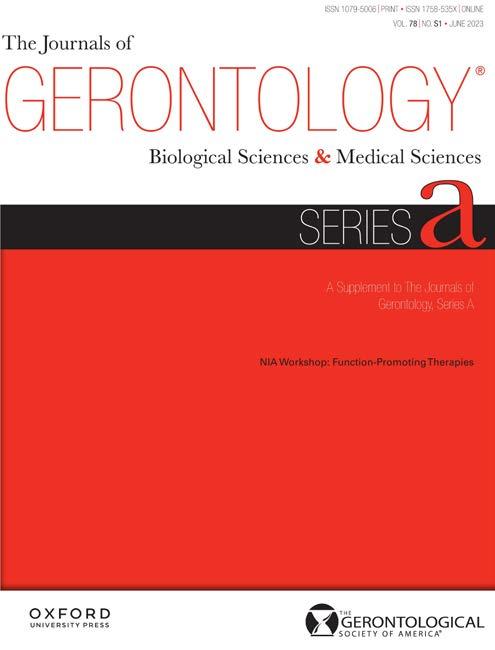
Engage with GSA on social media!
Experts have identified a public health need as well as strategic opportunities for the accelerated development of function-promoting therapies for older adults — and present new research on this topic in a supplemental issue of The Journals of Gerontology, Series A: Biological Sciences and Medical Sciences inspired by a March 2022 workshop convened by the National Institute on Aging (NIA), part of the National Institutes of Health.
The therapies addressed in the journal are those intended to prevent and treat functional limitations and physical disabilities
associated with aging and chronic diseases. According to the opening article by Guest Editor Rosaly Correade-Araujo, MD, MSc, PhD, age-related loss of muscle mass, strength, and function increases the risk of serious complications such as mobility limitations, falls and fractures, loss of independence, disability, metabolic disorders, and mortality. Across 15 additional articles, other authors highlight challenges and opportunities for establishing new function-promoting therapies, described as a “public health imperative.”
Continued on page 7
gerontology
news
From the GSA President Members Contribute to, and Benefit from, GSA’s Collective Weight
By James F. Nelson, PhD, FGSA • nelsonj@uthscsa.edu
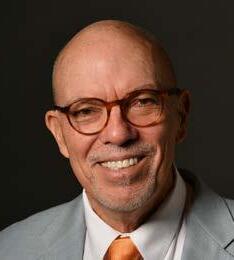
In the second quarter of my presidential year, I have had many wonderful opportunities to learn more about the growing reach and collective strength of our multidisciplinary Society. More than ever, GSA is a resource not just to our members but to the larger community as the challenges and opportunities of a growing population of older individuals become increasingly apparent to government, corporate leaders, and society at large.
As part of a new effort to engage members who are physically closest to our Annual Scientific Meeting, we are in the second year of making visits to colleges and universities in the state where the meeting will be held. CEO James Appleby and I made three visits this spring to Florida. These visits and their outcomes exemplify the collective strength of our society; our members and staff are always on the lookout for new ways to support members and fulfill our mission.
On our first trip this year, we visited University of Central Florida in Orlando and University of South Florida in Tampa. We later connected with HBCU Bethune-Cookman University in Daytona Beach, and in the spring traveled to Florida State University in Tallahassee and the University of Florida in Gainesville. It was empowering to experience firsthand the energy and passion of our diverse membership and to see how our visits energize trainees and mentors. These visits also reinforced the importance and visibility of the research and teaching of our members to deans and other administrators. Let me highlight three ideas these visits generated. The joy of mentoring
Meetings with students and newly minted investigators were uplifting. Learning about their passions for research and education in gerontology enabled us to feel the pulse of this generative segment of our membership, respond to their questions and better meet their needs. It was uplifting to be able to address their questions, offer encouragement, and introduce them to ESPO and the mentoring programs at GSA that can help
them achieve their goals. We learned about the Mentor Academy at the University of Florida, developed and led by GSA member Roger Filingham and met with participants and mentees who spoke to its benefits.
It’s programmed in our DNA to mentor, and I’ve found the inner drive to do so increases as I grow older — one of the longevity dividends that Linda Fried and others remind us come as we are gifted with longer lives that enable us to have even more to give and mentor. In a recent email, GSA Past President Linda George brought to my attention the particular importance of mentors personally introducing mentees to leaders in the field. Formalizing this one-on-one connection could strengthen our Society’s offerings and exemplifies the building bridges aspect of the theme of our upcoming meeting in Tampa, “Building Bridges > Catalyzing Research > Empowering All Ages.”
Emerging scholars will carry us forward and accelerate efforts to fulfill our mission.
Since my mentor, Caleb Finch, took me to my first GSA Annual Scientific Meeting in Portland, I have witnessed extraordinary growth of GSA programs to support students, postdoctoral fellows, and newly minted professionals. Of course, there is more we can and should do, as exemplified in Dr. George’s suggestion. Another area of need is travel funding. When I informally polled students in our graduate program what would be a priority for improving student support, top of their list was providing funds to enable travel to scientific meetings because of the value they gained from attending the meetings. Although we provide some travel stipends, most only provide nominal support. As president, my major objective is to enhance support for our emerging scholars. We have initiated a fundraising campaign to increase support for travel stipends that honors the founders of GSA, who in 1945 had the vision to start a Society that I am sure would amaze them. Please join me in supporting one or more of the GSA Emerging Scholars Funds. I’ve put my money where my mind is and I hope you will too.
Continued on page 15
editor-in-chief/lead author: Todd Kluss tkluss@geron.org
managing editor: Karen Tracy ktracy@geron.org
associate editor: Megan McCutcheon mmccutcheon@geron.org
circulation worldwide: 5,000
letters to the editor: We will publish letters to the editor in response to issues raised in the newsletter. Please limit letters to no more than 350 words. Letters should include the writer’s full name, address, and telephone number. Letters will be accepted or rejected at the sole discretion of the editors and may be edited for clarity or space. Send to: tkluss@geron.org
Gerontology News (ISSN 1083 222X) is published monthly by The Gerontological Society of America, 1101 14th Street NW, Suite 1220, Washington, DC 20005 and additional mailing offices. Subscription for members of the Society is included in annual dues. News items must be submitted by the first of the month prior to publication.
Copyright © 2023 by The Gerontological Society of America. Articles may be photocopied for educational purposes without permission. Please credit Gerontology News.
Send news items to: tkluss@geron.org
Send advertisements to: advertising@geron.org
Ad rates are available at www.geron.org
Advertising policy:
Gerontology News accepts ads for conferences and special events, fellowships, jobs, and degree programs relevant to the field of aging. We reserve the right to reject or discontinue any advertising. Ads do not constitute an endorsement by The Gerontological Society of America.
Volume 51, Issue 7, July 2023 gerontology news 2 • July 2023 • gerontology news
New Books by Members
• “The Measure of Our Age: Navigating Care, Safety, Money, and Meaning Later in Life,” by M. T. Connolly, JD. Published by PublicAffairs, 2023.
Members in the News
• On March 9, Rajean Moone, PhD, FGSA, was quoted and Karen Fredricksen Goldsen, PhD, FGSA, was mentioned in an LGBTQ Nation article titled “The power of data is showing researchers what older LGBTQ+ Americans actually need.”
• Bérénice Benayoun, PhD, was quoted in a May 2 Wired article titled “The Secrets of Aging Are Hidden in Your Ovaries.”
• Esteban Calvo, DrPH, MPH, and John W. Rowe, MD, FGSA, contributed an opinion piece to The Hill on June 1 titled “In an aging world, we must invest in older adults’ mental health.”
Member Referral Program
This month’s $25 amazon.com gift certificate winner:
Leslie Hasche, PhD, FGSA
The recipient, who became eligible after referring new member Asia Cutforth, was randomly selected using randomizer.org. For more details on the Member Referral Program, visit www.geron.org/referral.
Marcum Selected for New White House Post
Christopher Steven Marcum PhD, FGSA, has transitioned from his role in the White House Office of Science and Technology Policy (OSTP) as the assistant director for open science and data policy to the White House Office of Management and Budget (OMB), where he is serving as a senior statistician and senior science policy analyst.
Marcum oversaw transformative science policies in his OSTP portfolio that led to the 2022 OSTP Public Access Memo, the 2023 Federal Scientific Integrity Framework, and the White House declaring the 2023 as a Year of Open Science; he also brought topical expertise as a gerontologist that led to the inclusion of provisions protecting older LGBTQIA+ persons in a 2022 executive order. In his new role, Marcum will provide a social and behavioral perspective as a bridge between the science policy and statistical policy portfolios in the Office of Information and Regulatory Affairs at OMB. Marcum attended the University of California, Irvine (PhD, 2011), was a recipient of the National Institutes of Health Matilda White Riley Early Stage Investigator Award for his work on social networks and aging (2016), and was elected a fellow of GSA in 2022.
Cox Named to Federal Advisory Council
Carole Cox, MSW, PhD, FGSA, has been appointed to the U.S. Administration on Community Living Advisory Council to Support Grandparents Raising Grandchildren, as authorized by the Supporting Grandparents Raising Grandchildren Act, for a term of three years. As part of the council, she will play an important role in updating and implementing the first-ever National Strategy to Support Family Caregivers and in advancing the critical priority of supporting family caregivers, as recognized by President Joe Biden in his recently issued Care Executive Order.
She has done extensive research on caregivers for persons with Alzheimer’s disease, their needs, and use of services with a particular focus on ethnicity. Her interest and research on caregiving has expanded to include grandparents raising their grandchildren and she has written many articles as well as two books that deal with this growing population, “Empowering Grandparents Raising Grandchildren: A Training Manual for Group Leaders” (2000) and “To Grandmothers House We Go and Stay: Perspectives on Custodial Grandparents” (2000).
Bowers Joins Pathway Health as Senior Advisor
Barbara J. Bowers, PhD, RN, FAAN, FGSA, has been appointed a senior advisor for Pathway Health, a professional management, consulting, interim management, executive search and education services organization, serving clients across the post-acute care continuum.
Bowers is a professor emerita and the founding director of the Center for Aging Research and Education at the University of Wisconsin-Madison School of Nursing. Her research focuses on organizational models of care, particularly culture change models, staff development and resident quality of life. Her work has been funded by the National Institutes of Health, the Commonwealth Fund, The Cargill Foundation and the Robert Wood Johnson Foundation. Additionally, she has collaborated with researchers across many countries and has served on local, state, and federal policy workgroups related to long term care. In 2022, she received GSA’s Doris Schwartz Gerontological Nursing Research Award.
member
news
July 2023 • gerontology news • 3 ADVERTISE WITH US! See the current rates at www.geron.org/advertising. This newsletter reaches GSA’s 5,500 members both in print and online. Gerontology News accepts ads for conferences and special events, fellowships, jobs, and degree programs relevant to the field of aging.
By GSA Policy Advisor Brian W. Lindberg, MMHS
Summer Policy Potpourri
Spring Sprang into Summer.
Those of us in the nation’s capital have been focusing a lot on the amazing weather we’ve been having this Spring. Although technically we are in drought conditions, the lack of humidity has been, frankly, delightful. Not great for farmers, I know, but boy, it has been so enjoyable to walk to the many local briefings, meetings, and summits that have been blossoming this spring in Washington, D.C. (and beyond). In this month’s column, I provide updates, links, and news about events and happenings by colleagues and partners on some of the topics important to us. I feel hopeful knowing that there are so many committed, passionate, and active advocates in my sphere.
Elder Justice
Policy makers, researchers, and advocates highlighted World Elder Abuse Awareness Day (WEAAD), June 15, with several events. I know that GSA’s National Center to Reframe Aging conducted a robust social media campaign to raise awareness about WEAAD. In addition, on June 14, President Joe Biden issued a proclamation for the day. The Biden Administration has invested over $430 million to strengthen adult protective services (see my column in Gerontology News June 2023 for more information). The president encouraged “all Americans to be diligent, work together to strengthen existing partnerships, and develop new opportunities to improve our nation’s prevention and response to elder abuse, neglect, and exploitation.”
On June 15, the Elder Justice Coalition and the Senate Finance And Aging Committees hosted a virtual briefing in honor of WEAAD. The webinar focused on the state of elder justice in the United States with panelists presenting on issues facing adult protective services, resources for those in long-term care, nursing home staffing needs and medical legal partnerships.
The National Adult Protective Services Association and the Securities Industry and Financial Markets Association hosted a briefing at the U.S. Capitol on tools to fight senior financial exploitation in honor of WEAAD. Speakers were government officials and industry leaders who are working in partnership to combat financial exploitation.
The Long-Term Care Community Coalition (LTCCC) released a report entitled “They Make You Pay”: How Fear of Retaliation Silences Residents in America’s Nursing Homes in honor of WEAAD. The report is based on examination of 100 standard surveys and complaint investigation reports on nursing homes in 30 U.S. states. From the report: “Fear of retaliation is not something you can look up in a dictionary,” said Ronnie, a nursing home resident, “but if you live in a setting where you depend on others to care for you, you know exactly what it is.” LTCCC researchers hope to raise awareness of this issue and encourage further study and action to prevent these abusive situations.
Nursing home residents, their families, and their advocates received better news on June 8, when the U.S. Supreme Court handed down a 7–2 decision in favor of residents. In Health and Hospital Corporation
of Marion County v. Talevski, the court held that residents of public nursing homes can go to court to vindicate their rights under the Federal Nursing Home Reform Act (FNHRA). According to the Center for Medicare Advocacy, “Regulatory oversight of nursing homes has proven to be inadequate. Residents must be able to go to court to hold nursing homes accountable.” In this case, resident Gorgi Talevski was illegally sedated with a variety of psychotropic drugs and then illegally discharged from the residential facility. The federal district court dismissed the complaint, holding that FNHRA did not provide nursing home residents with a private right of action. The Seventh Circuit reversed the district court, and the U.S. Supreme Court upheld the Seventh Circuit’s decision.
Social Isolation
The Coalition to End Social Isolation and Loneliness (CESIL) commemorated Global Loneliness Awareness Week with Connections at the Capitol, which brought together members of Congress, advocates, poets, and mental health experts to explore ways to foster resilience and address social isolation and loneliness. GSA is a founding member of CESIL. Speakers included Senators Chris Murphy (D-CT) and Tina Smith (D-MN), who shared their perspectives on the path forward to building a more “socially connected” nation.
Women and Economic Security
The Women’s Institute for a Secure Retirement (WISER) and the National Council on Aging presented findings on May 16 from a nationwide survey on women and retirement issues. The survey, What Women Say about Their Finances, showed the concern and insecurity that adult women feel about their ability to pay bills, save for retirement, and prepare for emergency expenses. A majority of the 1,000 women surveyed supported policies such as tax breaks for caregivers, paid family and medical leave, and a government sponsored retirement savings plan for people who do not have an employer-sponsored plan.
WISER President and Founder Cindy Hounsell has been leading the charge for women’s retirement security and financial education since 1996. Recently, Hounsell was awarded the 2023 American Society on Aging’s Advancing Economic Security for Older Adults Award
Hounsell pointed out that the biggest challenge is getting more financial education and resources to the people who most need it — those without workplace retirement plans and with no way to save for an emergency fund. “When we can find $5 savings accounts for the underserved communities, they are most interested, but [there are] not enough banks or credit unions with savings vehicles for small savers.”
Medicare and Medicaid
The Center for Medicare Advocacy’s 10th annual National Voices of Medicare summit on April 20 focused on equitable access to care. Speakers provided informative and inspirational discussions about successful and ongoing efforts to create a health care system that serves all of us — caregivers, people with disabilities, and elders — equitably.
policy news 4 • July 2023 • gerontology news
Highlights of the recording of the summit include:
• Tricia Neumann, PhD, senior vice president of the Kaiser Family Foundation @ 00:23:00. Neumann pointed out that half of all beneficiaries live on an annual income of $30,000 or less with wide disparities based on race.
• Wey Wey Kwok, attorney at the Center for Medicare Advocacy on the topic of 10th anniversary of the Jimmo settlement @ 00:48:46. The Jimmo case revolves around the “improvement” standard: the Centers of Medicare & Medicaid Services interpreted (incorrectly) that Medicare would cover treatment only if it improved or restored a person’s health, whereas the correct standard is that treatments that maintain or prevent decline are allowable.
• Ted Kennedy, Jr., disability rights advocate, @ 2:08:00.
• Caregiving Panel: Ai-jen Poo, Sophia Colley, and Nicole Jorwic @ 3:22:00
Speaking of Medicare and such, the Center for Medicare and Medicaid Services announced reorganizational changes pertaining to the Center for Medicaid and CHIP Services, including renaming the Disabled and Elderly Health Programs Group to the Medicaid Benefits and Health Program Group.
Debt Limit and Appropriations
The drama around the debt limit and its ramifications continues. Conservative House members, annoyed with Speaker Kevin McCarthy (R-CA) for compromising on the debt limit, voted down a procedural ballot to express their frustration and halted action on the House floor for several days in June. According to conservative member Andy Biggs (R-AZ), “The Speaker formed a coalition with Democrats to get us a $4 trillion national debt. And I continued to be concerned because he hasn’t repudiated that coalition. And my guess is he’s prepared to do that again on the next three must-pass bills: Farm Bill, NDAA, and the budget.”
In the debt limit/fiscal deal negotiated by President Biden and Speaker McCarthy and passed by the House and Senate (Fiscal Responsibility Act of 2023), nondefense discretionary spending limits were part of the package in addition to raising the debt ceiling until January 2025. The nondefense discretionary spending will be flat for FY 2024 (which starts October 1) and rise only one percent for the following year. Because of inflation, this amounts to spending cuts for health care and scientific research (National Institutes of Health, Centers for Disease Control and Prevention, National Science Foundation), education, environmental issues (Environmental Protection Agency), housing, Special Supplemental Nutrition Program for Women, Infants, and Children, law enforcement (FBI) and other programs that are funded through the appropriations process.
The new law (PL 118-5) includes other provisions, such as:
• increasing work requirements for the Supplemental Nutrition Assistance Program and cash welfare but does not alter requirements for Medicaid;
• expanding food stamp access for veterans, homeless people and young adults transitioning out of the foster care system;
• recouping unused COVID-19 funds;
• allowing increases in military spending;
• rescinding $1.4 billion of the $80 billion allocated to the Internal Revenue Service in 2022;
• resuming federal student loan repayments on August 29, 2023;
• pushing through the Mountain Valley Pipeline project in West Virginia and Virginia over citizen objections.
Now the House Appropriations Committee has voted out a bill that sets the top spending level at $1.47 trillion, instead of the $1.59 trillion laid out in the debt limit package. Chair Kay Granger (R-TX) said that while the debt limit deal set a topline spending limit, it did not require the committee to spend all the way up to that level. “Simply put, the debt ceiling bill set a ceiling, not a floor, for fiscal year 2024 bills,” she said. This concerns advocates who envision what the $120 billion cut portends for their programs on top of the current spending caps. The possibility of a government shutdown is already being floated.
Finally, with lots going on in the policy space, we also observed the second year of Juneteenth as a federal holiday. Biden gave remarks at a concert in honor of that day.
Recent GSA Policy Actions
GSA signed onto a letter to congressional leaders organized by the Coalition to End Social Isolation and Loneliness, urging them to include critical reforms in future legislative efforts that address the growing crisis of social isolation and loneliness in the U.S. and ensure all Americans have the opportunities and supports necessary to be socially engaged in society.
GSA submitted a letter to the Centers for Medicare & Medicaid Services (CMS )to express support for the inclusion of the Geriatrics Hospital Measure and the Geriatrics Surgical Measure in the CMS Hospital Inpatient Quality Reporting Program. These measures are a new type of measure, a “programmatic composite” measure, that considers the full program of care needed for geriatric patients.
GSA, working with the conveners of its Obesity and Aging Interest Group, submitted comments for the U.S. Preventive Services Task Force (USPSTF) Draft Research Plan on Weight Loss Interventions to Prevent Obesity-Related Morbidity and Mortality: Interventions. Elevating obesity disease management to the forefront will help primary care providers care for people with diabetes, hypertension, osteoarthritis, and many other diseases. GSA noted that the proposed framework identifies adults as one homogenous group and requests that USPSTF consider approaches the recognize our heterogeneity as we age.
Continued policy news
July 2023 • gerontology news • 5
new resources
Dashboard Includes Health Metrics for All Congressional Districts
The Congressional District Health Dashboard, developed by the Department of Population Health at the NYU Grossman School of Medicine in partnership with the Robert Wood Johnson Foundation, is now live. The Dashboard will equip users with firstof-its-kind data on health and the conditions that affect health in every congressional district across the country. This new dashboard site builds on the experience creating and managing the City Health Dashboard and provides important data on health and equity, but now calculated to the congressional district level.
Federal Agency Issues Updated Profile of Older Americans
The Administration for Community Living has released the 2021 Profile of Older Americans, an annual summary of critical statistics related to the older population in the U.S.
Relying primarily on data offered by the U.S. Census Bureau, the 2021 Profile of Older Americans illustrates the shifting demographics of Americans age 65 and older. It includes key topic areas such as income, living arrangements, education, and health. The 2021 Profile includes a special section on family caregiving.
The report is prepared by the Administration on Aging, part of the Administration for Community Living, an operating division of the U.S. Department of Health and Human Services. Principal sources of data are the U.S. Census Bureau, the National Center for Health Statistics, and the Bureau of Labor Statistics.
DEC Releases New Resources for Diverse Caregivers
The Diverse Elders Coalition (DEC) has launched a web page on caregiving that features updated information about the trainings it offers to meet the needs of diverse family caregivers. Recently, the DEC and its member organizations have revamped the “Caring for Those Who Care: Meeting the Needs of Diverse Family Caregivers” training curriculum to ensure their curriculum aligns with the unique cultural and linguistic experiences of diverse family caregivers today.
The curriculum is a resource for health and social service providers and aging professionals to learn about the unique needs
of diverse family caregivers. The training curriculum will equip professionals with insights into the lived experiences of African American and Black caregivers; American Indian and Alaska Native caregivers; Chinese American and Korean American caregivers; Hispanic and Latino caregivers; Lesbian, Gay, Bisexual, Queer, Questioning and Transgender (LGBTQ+) caregivers; and Southeast Asian American caregivers.
National Poll on Healthy Aging Data Available for Download
The University of Michigan National Poll on Healthy Aging (NPHA) recently published its seventh wave of data for free public use through the National Archive of Computerized Data on Aging (NACDA)’s Open Aging Repository to help advance research on aging and health. The NPHA is a nationally representative survey of approximately 2,000 U.S. adults age 50 to 80, sponsored by AARP and Michigan Medicine and directed by the University of Michigan Institute for Healthcare Policy & Innovation. Topics included in the newly released data from the June 2020 poll (Wave 7) include: advance care planning, loneliness, hearing, emergency department visits, the built environment, and telehealth. Information on all available waves of NPHA data can also be found online
Updated Decision Tree Serves as Tool for Treatment of Agitation in Alzheimer’s
Agitation in Alzheimer’s disease impacts nearly 80 percent of persons with Alzheimer’s disease and is a cause of significant distress for patients and family/professional caregivers. GSA’s new Agitation in Alzheimer’s Disease Decision Tree walks the clinician through a range of non-pharmacologic treatment options and highlights rational use of pharmacotherapies as well as their hazards in this vulnerable population. Informed by an expert panel, GSA developed the decision tree that was presented as a poster at the GSA Annual Scientific Meeting in November 2022 and recently updated to reflect the final International Psychogeriatric Association consensus clinical and research definition of agitation in cognitive disorders.
Continued from page 1 - Fellowship Offers Reporters Valuable Insight as America Ages
The program’s co-founder, Journalists Network on Generations National Coordinator Paul Kleyman, serves as senior advisor and editorial consultant.
As in previous years, half of the fellows will be selected from generalaudience media and half from ethnic or other minority media outlets that serve communities within the U.S. Staff and freelance reporters and who are covering or wish to cover issues in aging are eligible to apply.
The program’s in-person activities will bring the fellows to GSA’s 2023 Annual Scientific Meeting, which will take place from November 8 to 12 in Tampa, Florida, with the theme of “Building Bridges > Catalyzing Research > Empowering All Ages.” There the fellows will participate in an exclusive educational workshop, which will showcase demographic trends
and research highlights and include discussions with veteran journalists on how to position aging stories in the current media environment.
The fellowship requires reporters to deliver two projects based on current aging research, including a short-initial story and major piece or series in the following months. All applications for the fellowship program will be reviewed by a selection committee of gerontologists and editorial professionals. The criteria will include clarity and originality of proposed in-depth story projects; quality of samples of published or produced work; and high-impact potential of proposals geographically and across different ethnic or racial populations. A continuously updated list of stories from the fellows is available online.
6 • July 2023 • gerontology news
Get to Know Your Junior Leaders: Biological Sciences Section
By Bhaswati Ghosh, MS, Pennington Biomedical Research Center; and Matt Yousefzadeh, PhD, Columbia University Medical Center
We are Bhaswati Ghosh and Matt Yousefzadeh, and we are excited to introduce ourselves as the Biological Sciences Section junior leaders for 2023. Bhaswati is currently a post-doctoral trainee in Dr. Elizabeth Floyd’s lab at Pennington Biomedical Research Center. Matt is a new faculty member starting his lab at Columbia University Medical Center. We are working closely with the other members of the Biological Sciences Section to plan some great activities for the upcoming annual meeting and beyond.
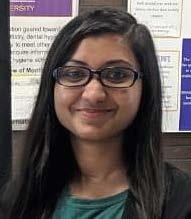
Firstly, in June 2023, we hosted a webinar specifically for the early career members on “ Transitioning to Academic and NonAcademic Careers in Aging: K Awards from the NIH”, focusing on two new awards: Research and Entrepreneurial Development Immersion (REDI) K01 and K22, which provide funds for nonacademic and academic positions respectively. This event was presented by Christy Carter and Jamie Lahvic from the National Institutes of Health, Rozalyn Anderson from the University of Wisconsin-Madison, and William S. Middleton Memorial Veterans Hospital. Beyond the presentation, there was a dedicated time for attendees to ask questions to the experts, who provided constructive guidance towards writing and submission of a successful application.
Secondly, the Biological Sciences Section is working to empower diversity in aging research. We will be offering eight travel awards for underrepresented minorities emerging in the aging field to attend the GSA Annual Scientific Meeting. These awards are for graduate students, postdocs, and early-stage faculty, and if you want more information, contact GSA Vice President of Policy and Professional Affairs Patricia D’Antonio at biosciaward@geron.org. Additionally, the Emerging Scholar and Professional Organization (ESPO) section of the GSA is working
Continued from page 1 - NIA Workshop Yields New
to partner with the American Aging Association on hosting a booth at Society for Advancement of Chicanos/Hispanics & Native Americans in Science to broaden interactions with early career scientists.
Finally, we are excited to announce the speakers for the Biological Sciences Section ESPO session at the 2023 GSA Annual Scientific Meeting. This session continues to be the highlight of the program, recognizing the great work done by the graduate students and postdoctoral fellows in the field of biology of aging. We will hear from Sarah Ashiqueali of University of Central Florida talking about “Antidiabetic Therapies Metformin and Trodusquemine Modulate miRNA involved with Liver Metabolism”; Jose Diaz from Penn State University about “Intraindividual Variability in Sleep Duration is Associated with Hippocampal Volume in Midlife”; Sidharth Mishra from University of South Florida about “Suppression of microbiome sensing-free fatty acid receptor 2 (FFAR2) signaling exhibits early aging”; and Nisi Jiang from University of Texas San Antonio about “The Role of Castration Before or After Puberty on Sex Differences in Growth and Longevity in UM-HET3 Mice.” We are also organizing a program called “Section Recognition & Networking,” which will feature the recognition of section award recipients and new trainees and fellows and will also include dedicated time for networking during the meeting.
The Biological Sciences Section activities at the Annual Scientific Meeting are designed to showcase the professional excellence of both new faces and established investigators in the field of aging, with diversifying topics including proteostasis, senescence, epigenetics, sex dimorphism and physiology in aging. We are excited to see you all in Tampa!
Function-Promoting Therapy
Correa-de-Araujo, who serves as a senior scientific advisor at the NIA’s Division of Geriatrics and Clinical Gerontology, said she sees a viable model in the recent response to the COVID-19 pandemic, which motivated efforts among various stakeholders — multiple government agencies, the pharmaceutical industry, academic investigators, and others — to rapidly and successfully develop new vaccines.
“In aging, similar complex and coordinated efforts can be taken
Research
to accelerate the development of function-promoting therapies to address the aging-related loss of muscle mass, strength, and function and the consequent serious adverse effects on healthspan and quality of life,” Correa-de-Araujo wrote. “The knowledge shared in this special issue has the potential to facilitate such partnerships at national and international levels to address a pressing public health need and to enhance the health, functional independence, and quality of life of older adults worldwide.”
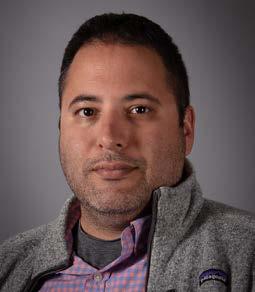
July 2023 • gerontology news • 7
espo news
The Emerging Scholar and Professional Organization includes all student and transitional members of GSA.
Ghosh Yousefzadeh
GSA Honors Outstanding Individuals
Please join us in congratulating our 2023 awardees!
GSA salutes outstanding research, recognizes distinguished leadership in teaching and service, and fosters new ideas through a host of awards. Nominated by their peers, the recipients’ achievements serve as milestones in the history and development of gerontology.
The awardees will be recognized at this year’s GSA Annual Scientific Meeting, taking place November 8 to 12 in Tampa, Florida. Check the final meeting program for all dates, times, and room location assignments for award events.
SOCIETY-WIDE AWARDS
Donald P. Kent Award
Kathleen Wilber, PhD, FGSA, FAGHE
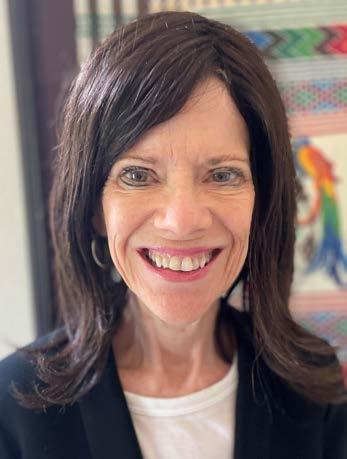
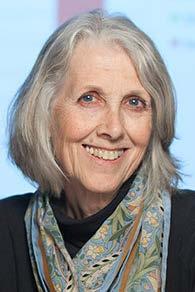
University of Southern California
James Jackson Outstanding Mentorship Award
Jacqueline L. Angel, PhD, FGSA
University of Texas at Austin
Maxwell A. Pollack Award for Productive Aging
Bei Wu, PhD, FGSA, FAGHE
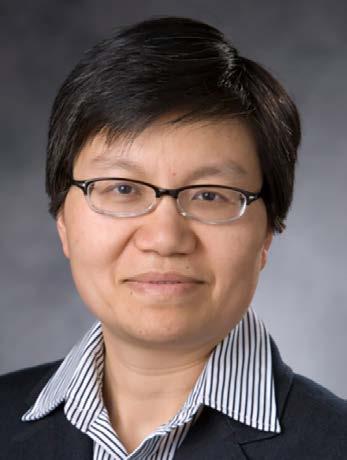
New York University
Robert W. Kleemeier Award
David M. Almeida, PhD, FGSA
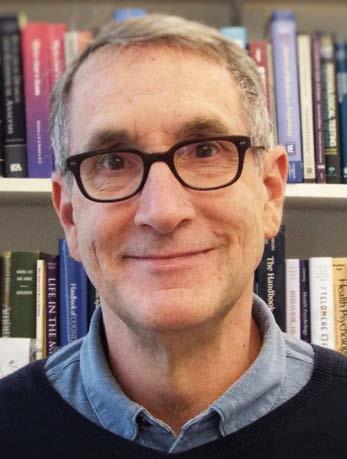
Pennsylvania State University
Margret M. and Paul B. Baltes Foundation Award
Reuben Ng, PhD
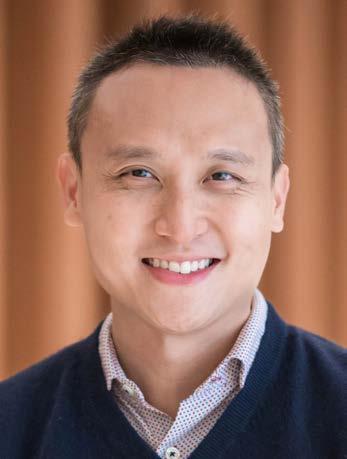
National University of Singapore
Doris Schwartz Gerontological Nursing Research Award
J. Taylor Harden, PhD, RN, FGSA, FAAN
University of Texas at Austin
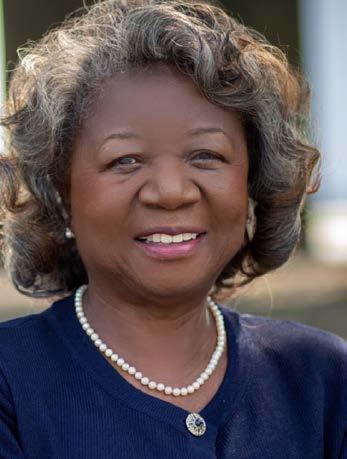
8 • July 2023 • gerontology news
2023 awardees
ACADEMY FOR GERONTOLOGY IN HIGHER EDUCATION
Clark Tibbitts Award
Edward L. Schneider, MD, FGSA, FAGHE
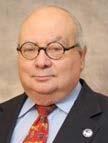
University of Southern California
Distinguished Faculty Award
Lisa Borrero, PhD, FAGHE
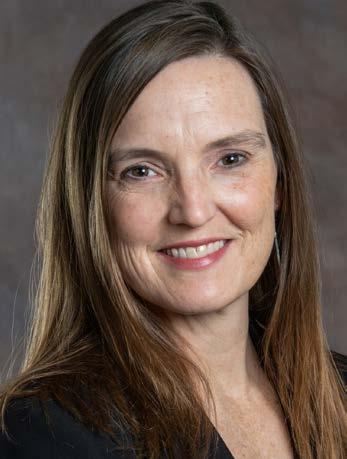
University of Indianapolis
Rising Star Early Career Faculty Award
Nasreen Sadeq, PhD
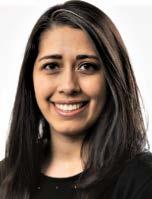
University of South Florida
Hiram J. Friedsam Mentorship Award
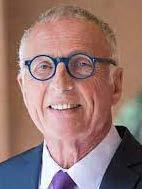
Harvey L. Sterns, PhD, FGSA, FAGHE
The University of Akron
Rising Star Early Career Faculty Award
Bérénice A. Benayoun, PhD

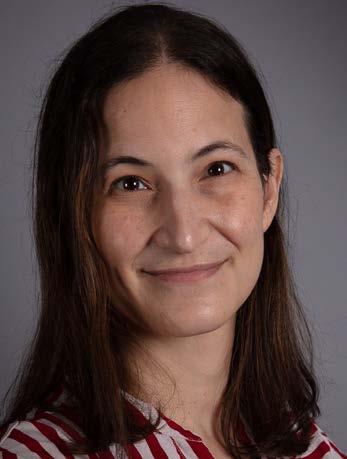
University of Southern California
Student Leadership Award
Giuliana Casanova, MSG, MSW, BA
University of Aveiro and University of Porto
July 2023 • gerontology news • 9
2023 awardees
BEHAVIORAL AND SOCIAL SCIENCES SECTION
Distinguished Career Contribution to Gerontology Award
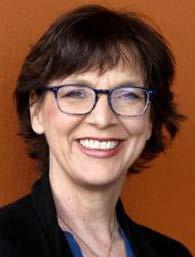
Kenneth F. Ferraro, PhD, FGSA
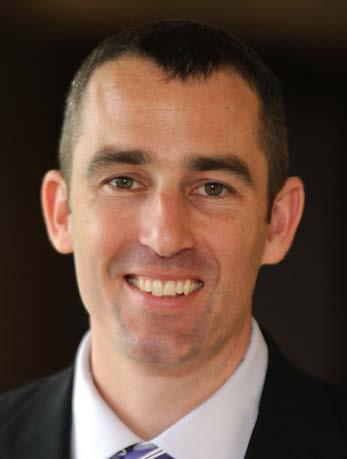
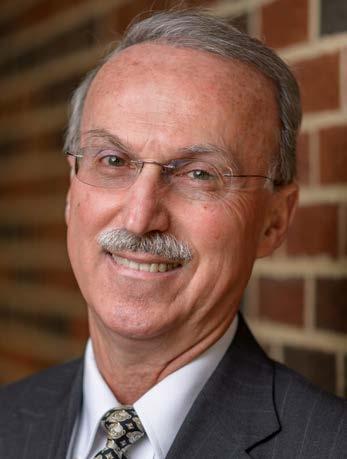
Purdue University
BIOLOGICAL SCIENCES
Richard Kalish Innovative Publication Award
Becca Levy, PhD, FGSA
Yale University
HEALTH SCIENCES SECTION
Distinguished Mentorship in Gerontology Award
Susan T. Charles, PhD, FGSA
University of California, Irvine
Richard Kalish Innovative Publication Award
Debra Umberson, PhD, FGSA
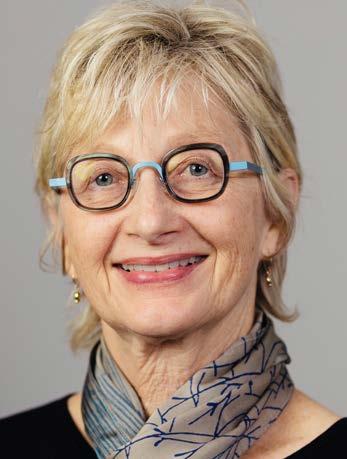
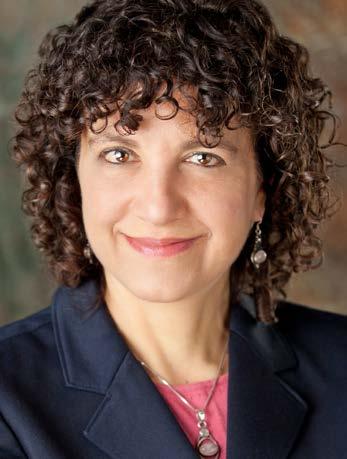
University of Texas
Nathan Shock New Investigator Award
Ming Xu, PhD
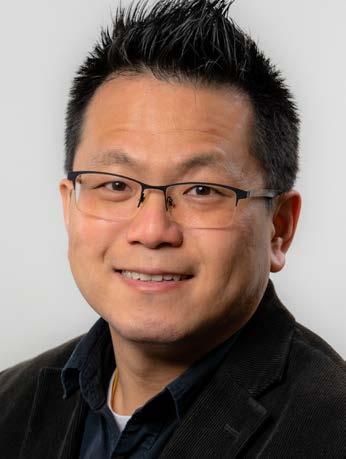
University of Connecticut
Excellence in Rehabilitation of Aging Persons Award
Brad Manor, PhD
Hinda and Arthur Marcus Institute for Aging Research
Joseph T. Freeman Award
Joe Verghese, MD, FGSA
Albert Einstein College of Medicine
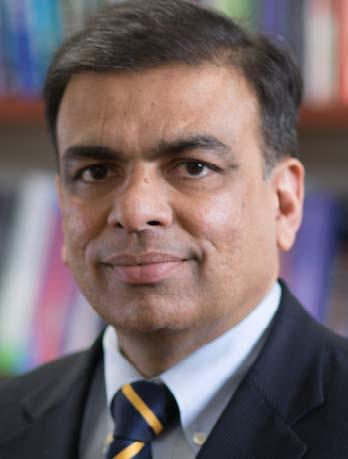
10 • July 2023 • gerontology news
2023 awardees
SOCIAL REASEARCH, POLICY AND PRACTICE SECTION
Please check the final meeting program for all dates, times, and room location assignments for award events.
Carroll L. Estes Rising Star Award
Sara G. Bybee, PhD, LCSW University of Utah
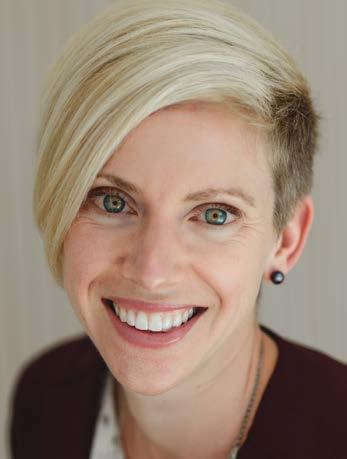
GSA thanks the following award sponsors:
The New York Community Trust (Pollack Award)
Margret M. & Paul B. Baltes Foundation (Baltes Award)
Barbara J. Berkman, DSW/PhD, FGSA (Berkman Award)
Polisher Research Institute of Abramson Senior Care (Lawton Award)
Additionally, the following award nominations, along with a variety of travel awards, are open until July 31:
Society-Wide
M. Powell Lawton Award
Academy for Gerontology in Higher Education
Mildred M. Seltzer Distinguished Service Honor
Part-Time/Adjunct Faculty Honor
Administrative Leadership Honor
Graduate Student Paper Award
James McKenney Student Travel Award
Behavioral and Social Sciences Section
Student Research Award
Boaz Kahana Student Poster Award
Behavioral and Social Sciences Student Travel Stipend
Emerging Scholar and Professional Organization
Interdisciplinary Paper Award
Poster Award
Douglas Holmes Award
Minority Issues Poster Award
Carol A. Schutz Travel Award
TJ McCallum Memorial Student Travel Award
Health Sciences Section
Austin Bloch Award
Health Sciences Student Travel Stipend
Person-in-Training Award
Research Award
Social Research, Policy, and Practice Section
Barbara J. Berkman Award
Elaine M. Brody Thought Leader Award
Outstanding Student Poster Award
Social Research, Policy, and Practice Student Travel Stiped
To learn more about GSA awards and for more information about our 2023 summer award nominations, visit www.geron.org/membership/awards.
July 2023 • gerontology news • 11
Distinguished Members Granted Fellow Status
GSA’s Board of Directors has approved the following 49 individuals for fellow status within the Society. In addition to being honored during the Fellows and International Reception at the Annual Scientific Meeting, they will be presented with fellow certificates and pins at their respective section business meetings.
Fellow status is peer recognition for outstanding contributions to the field of gerontology and represents the highest category of membership. This distinction comes at varying points in a person’s career and is given for diverse activities that include research, teaching, administration, public service, practice, and notable participation in the Society.
The Academy for Gerontology in Higher Education
Katarina Friberg-Felsted, PhD, FAGHE, University of Utah; Ramraj Gautam, PhD, FAGHE, University of Massachusetts Lowell
Behavioral and Social Sciences Section
Carolyn Adams-Price, PhD, FGSA, Mississippi State University; Lisa L. Barnes, PhD, FGSA, Rush University Medical Center; Monique J. Brown, PhD, MPH, FGSA, University of South Carolina; Michael Crowe, PhD, FGSA, University of Alabama at Birmingham; Tina Leigh Dothard Peterson, PhD, MSW, MPH, CSW, FGSA, The University of Cincinnati; Sam Fazio, PhD, FGSA, Alzheimer’s Association; Eileen Graham, PhD, FGSA, Northwestern University; Tiffany F. Hughes, PhD, MPH, MBA, FGSA, Youngstown State University; Richard Ellis Kennedy, MD, PhD, FGSA, University of Alabama at Birmingham; Gloria Luong, PhD, FGSA, Colorado State University; Christine Armstrong Mair, PhD, FGSA, University of Maryland, Baltimore County; Wingyun Mak, PhD, FGSA, The New Jewish Home Research Institute on Aging; Shannon T. Mejía, PhD, FGSA, University of Illinois Urbana-Champaign; Lisa M. Soederberg Miller, PhD, FGSA, University of California, Davis; Chivon A. Mingo, PhD, FGSA, Georgia State University; Heehyul Esther Moon, PhD, MS, FGSA, University of Louisville; Dennis R. Myers, PhD, LCSW, FGSA, Baylor University; Amy Rauer, PhD, FGSA, University of Tennessee, Knoxville; Sudha Shreeniwas, PhD, FGSA, University of North Carolina Greensboro; Deborah M. Whitley, PhD, MPH, FGSA, Georgia State University; Lisa Ann Kirk Wiese, PhD, MSN, RN, GERO-BC, PHNA-BC, CNE, FGSA, Florida Atlantic University; Takashi Yamashita, PhD, MPH, MA, FGSA, University of Maryland, Baltimore County; Xin Zhang, PhD, FGSA, Peking University
Biological Sciences Section
Rich Allsopp, PhD, FGSA, University of Hawaii; Kylie Kavanagh DVM, MS, MPH, FGSA, Wake Forest University School of Medicine; Steven J. Prior, PhD, FGSA, University of Maryland, College Park
Health Sciences Section
Candace S. Brown, PhD, MA, MEd, FGSA, University of North Carolina, Charlotte; Harleah G. Buck, PhD, RN, FPCN, FAHA, FGSA, FAAN, The University of Iowa; Thomas V. Caprio, MD, MPH, MS, FGSA, University of Rochester; Wen Liu, PhD, MSN, RN, FGSA, The University of Iowa; Jennifer M. Reckrey, MD, FGSA, Icahn School of Medicine at Mount Sinai; Debra Saliba, MD, MPH, AGSF, FGSA, UCLA Borun Center & VA Los Angeles GRECC; Elizabeth Vásquez, DrPH, FGSA, University at Albany (SUNY); Yu Doris Sau-fung RN, BSc(Nursing), PhD, FHKAN, FAAN, The University of Hong Kong; Oleg Zaslavsky, PhD, MHA, RN, FAAN, FGSA, University of Washington
Social Research, Policy, and Practice Section
Marc Cohen PhD, MPP, FGSA, University of Massachusetts Boston; Phyllis Cummins, PhD, FGSA, Miami University; Susan E. Hickman, PhD, FGSA, Indiana University; Su-I Hou, DrPH, MPH, BSN, CPH, MCHES, RN, CDP, FACHE, FGSA, University of Central Florida; Suk-Young Kang, PhD, MSSW, FGSA, Binghamton University; Christopher M. Kelly, PhD, FGSA, University of Nebraska at Omaha; R. Tamara Konetzka, PhD, FGSA, University of Chicago; Adria E. Navarro, PhD, LCSW, FGSA, University of Southern California; Nicole Ruggiano, PhD, MSW, FGSA, University of Alabama; April Temple, PhD, FGSA, James Madison University; Tiffany R. Washington, PhD, MSW, FGSA, University of Georgia; Ling Xu, PhD, FGSA, University of Texas at Arlington
To learn more about the nomination process and see a listing of all fellows, visit www.geron.org/membership/fellows.
12 • July 2023 • gerontology news new
fellows
An Inter-University Panel Reflects on Careers in Aging Week
By Elise Eifert (UNC Greensboro), Cynthia Hancock (UNC Charlotte), Tina M. K. Newsham (UNC Wilmington), and Chantelle Caro (UNC Greensboro)
To promote gerontological education and careers in aging, the gerontology programs at the University of North Carolina at Greensboro, the University of North Carolina at Charlotte, and the University of North Carolina Wilmington collaborated during Careers in Aging Week 2023 (CIAW) by organizing a virtual discussion featuring alums from all three programs. This may seem unusual given that these programs hypothetically compete for students, funding, visibility and prestige, and even survival. However, the programs are unique in key aspects that are not in direct competition. While all three programs offer an undergraduate gerontology minor, their other offerings differ. Collectively, these programs provide options to meet the learning needs of different students and serve to prepare the aging services workforce in North Carolina and beyond. Furthermore, the leaders of these programs believe that increasing awareness of gerontological education and careers in aging will benefit and elevate all Gerontology programs.
Development
In February 2023, Elise Eifert, the program coordinator at UNC Greensboro, reached out to Cynthia Hancock and Tina Newsham, the coordinators for the gerontology programs at UNC Charlotte and UNC Wilmington, respectively, to promote each other’s CIAW activities. The goal was to increase and diversify participants’ access opportunities during CIAW. While institutions may host a small number of CIAW events, with inter-university cooperation, the number of events available to everyone increases. Inter-institutional cooperation also increases participation in events from members of further-away communities. It expands the reach and increases the visibility of each institution’s CIAW activities while exposing more people to career opportunities in aging.
As the coordinators discussed their CIAW plans, the idea was to collaborate on a virtual panel of alumni from each institution’s program to discuss their careers. Each program coordinator identified two alums to speak on the panel, paying particular attention to having a diverse range of perspectives, careers, and time since graduation reflected in the panel. The program coordinators developed questions for the panel to promote careers in aging by highlighting opportunities, pathways, challenges, and trends related to aging.
The virtual discussion was hosted via Zoom and recorded for later viewing
Panel Highlights
The panelists came with a wealth of knowledge and experience to share with the audience. Each panelist described their journey
to gerontology work and how their education prepared them. Gerontology programs helped panelists narrow their interests to a career field, build connections, provide experiential learning, and provide a “leg up” when starting their career path. All panelists agreed there is no direct path in the field. Advice from panelists included: “Figure out what problem you want to solve and figure out what career will help you to do so — even if you need to create the career.” Don’t be afraid — there is great job security as there will always be older adults. “If you want to earn a lot of money this might not be the career field for you.” Focus on what interests you. And recognizing that we have an older generation of people who have participated in large social movements. One panelist noted, “these people [older adults] have been making waves their entire life, and I don’t expect it to stop.” Viewers were encouraged to change the narrative of aging — to realize that we can learn much from older adults. All agreed that we needed to help others see the value of this field of study.
Benefits and Future Suggestions
This virtual panel provided an excellent opportunity to inform prospective students (attendees included high school students, nongerontology students, and community members, among others) about the benefits of gerontology education. We encourage others to invite members of these groups to their program activities for CIAW and beyond. One non-gerontology student who attended reflected that she only thought of “bedside care and nursing facilities” when she thought of careers in aging before the event. Afterward, she said, she realized “that there are endless possibilities beyond bedside care.” Another attendee shared that the panel made him “rethink and reevaluate his ideas” about not wanting to work in the field.
From its inception, this collaboration was embedded in the gerontology programs’ shared goals, values, and visions. Given the powerful outcomes for attendees and the relative simplicity of putting together virtual panels, the inter-institutional collaboration described here is something these schools will repeat. We hope this event also serves as a model for other institutions to work together to promote careers in aging and the value of gerontology education. Notably, as the CIAW alum panel evolved, we became aware of other opportunities for collaboration. We strongly encourage other gerontology programs to consider inter-university events during CIAW and throughout the year. This reflects the collaborative nature of the discipline of gerontology and promotes and elevates gerontological education and careers in aging everywhere.
July 2023 • gerontology news • 13 educational news
GSA Journals Begin Publishing Graphical Abstracts
Authors are now able to submit a graphical abstract as part of their article submission to GSA’s journals, in addition to the required text abstract. The graphical abstract should clearly summarize the focus and findings of the article and will be published as part of the article online and in PDF format. The graphical abstract should be distinct from any of the submitted figures. The file should use simple labels and employ text sparingly. An example of the GSA journal graphical abstract can be seen online. Review each journal’s author guidelines for additional information.
GSA Journal Alerts: Delivered Right to Your Inbox!
Stay up to date on the latest research with content alerts delivered to you via email. This free service from Oxford University Press allows you to create custom email alerts to make sure you never miss out on the latest research from your favorite GSA publications. Just follow the steps below:
1. Register for an Oxford Academic account. This will allow you to sign up for email alerts, purchase content, and save searches.
2. Once you’ve registered, click on your email address in the upper right hand corner.
3. From the drop-down menu, click on “Email Alerts.”
4. To register for New Issue Alerts (delivered with each new journal issue), click on “Add Alerts” under “New Issue Alerts.” Check the box next to any publication you wish to receive alerts from, and click “Add Alerts.”
5. To register for Advance Article Alerts (highlights the newest content weeks before it is included in an issue), click on “Add Alerts” under “Advance Article Alerts.” Check the box next to any publication you wish to receive alerts from, and select the frequency you wish to receive them (daily or weekly). Click on “Add Alerts.”
6. That’s it, you’re all signed up! You can edit your preferences at any time by logging back in to your Oxford Academic account.
Physical Function May Be Preserved by Managing Cardiovascular Disease Risk Factors
Managing cardiovascular disease (CVD) risk factors may play a role in preserving physical function during the aging process, according to a new research article published in The Journals of Gerontology, Series A: Biological Sciences and Medical Sciences
“Approximately 10 percent of older adults have muscle weakness and diminished physical function that leads to adverse health outcomes and physical disability,” said lead author Shivani Sahni, PhD. “Since loss of physical function contributes to reduced mobility, disability, institutionalization, and mortality, management of CVD risk factors can help preserve physical function with age.”
This article, titled “Association of Vascular Health Measures and Physical Function: A Prospective Analysis in the Framingham Heart Study,” showed that vascular measures are associated with grip strength in cross-sectional analyses and change in gait speed (a measure of physical function) in longitudinal analyses.
This is one of the first community-based studies to comprehensively examine the relationship of aortic stiffness and vascular function with age-related decline in physical function. Higher aortic stiffness was associated with loss of physical function over ~11 years, said Sahni, who is an associate professor of medicine at Harvard Medical School and an associate scientist at the Hinda and Arthur Marcus Institute for Aging Research at Hebrew SeniorLife. She directs the Nutrition Program at the Marcus Institute.
Blood flow declines with aging, in part due to arterial stiffening. Consequent dysfunction in blood vessel dynamics may contribute to organ pathology and declines in muscle mass, explained Sahni. Yet, few studies have specifically assessed the role of vascular function, and changes in functional muscle measures such as mobility and muscle strength.
The current study utilized data from a large cohort of relatively healthy men and women and extends previous investigations by utilizing a longitudinal study design.
The majority of previously published studies have utilized crosssectional study designs with modest sample sizes. The authors said they believe that future studies should evaluate whether interventions that target vascular health may reduce age-related declines in physical function. This is important because one third of older adults experience physical limitations contributing to reduced mobility, disability, institutionalization, and mortality. Hence, there is a need for development of novel interventions that target prevention of physical limitations in older adults.
Disadvantaged Neighborhoods and Depression Symptoms Associated with Premature Aging
Feeling depressed and living in a deprived urban neighborhood could be making you age faster, according to a new study led by researchers at McMaster University.
The findings, published in The Journals of Gerontology, Series A: Biological Sciences and Medical Sciences, showed that living in urban environments marked by material and social inequities, and having depression symptoms, were independently associated with premature biological aging, even after accounting for individuallevel health and behavioral risk factors, such as chronic conditions and poor health behaviors.
Parminder Raina, PhD, a professor in the Department of Health Research Methods, Evidence, and Impact at McMaster University, led the research team, which included investigators from the Netherlands, Norway, and Switzerland.
“Our study used two DNA methylation-based estimators, known as epigenetic clocks, to examine aging at the cellular level and estimate the difference between chronological age and biological age,” said Divya Joshi, PhD, the study’s first author and a research associate in the Department of Health Research Methods, Evidence, and Impact at McMaster.
“Our findings showed that neighborhood deprivation and depressive symptoms were positively associated with acceleration of the epigenetic age estimated using the DNAm GrimAge clock. This adds
14 • July 2023 • gerontology news
journal news
to the growing body of evidence that living in urban areas with higher levels of neighborhood deprivation and having depression symptoms are both associated with premature biological aging,” Joshi said.
Depressive symptoms in the study were measured using a 10-item standardized depression scale. The researchers found an acceleration in the risk of death by one month for every point increase on the depressive symptom score. They theorized that emotional distress caused by depression may result in more biological wear and tear and dysregulation of physiological systems, which in turn could lead to premature aging.
The researchers assessed neighborhood material and social deprivation using two indices that were developed by the
Canadian Urban Environmental Health Research Consortium based on 2011 census.
Social deprivation reflects the presence of fewer social resources in the family and community, and material deprivation is an indicator of people’s inability to access goods and conveniences of modern life, such as adequate housing, nutritious food, a car, highspeed internet, or a neighborhood with recreational facilities.
The researchers found an increase in the risk of death by almost one year for those exposed to greater neighborhood deprivation compared to lower neighborhood deprivation.
The study did not find that neighborhood deprivation amplified the effect of depressive symptoms on epigenetic age acceleration.
funding opportunities
Brain Foundation Offers Scholarships for Emerging Scholars
The American Brain Foundation’s Next Generation Research Grants program funds multi-year mentored scholarships for early career investigators who are interested in a career in research. Awards are available for multiple disease areas, including Alzheimer’s and related dementias, cognitive aging and age-related memory loss, peripheral neuropathy, and healthcare disparities. Scholarships consist of multi-year salary and research support and are awarded in collaboration with the American Academy of Neurology. Over 85 percent of recipients have gone on to receive additional funding from the National Institutes of Health and other entities to continue their careers in research.
NIH To Offer DEIA Funding Competition for Institutions
On April 4, the National Institutes of Health (NIH) announced the Institutional Excellence in DEIA in Biomedical and Behavioral Research Prize Competition, which aims to recognize and reward effective strategies for enhancing diversity, equity, inclusion, and accessibility (DEIA) in research environments across the U.S. NIH will award up to 10 prizes of $100,000 each through the competition. Up to half of the prizes will be set aside for consideration for limited-resourced institutions To participate, registration is required by September 12. Visit the prize competition website for information about eligibility, participation, and submission requirements.
Continued from page 1 - Members Contribute to, and Benefit from, GSA’s Collective Weight “Prophets are not recognized in their own country.”
In several instances, our visits to Florida and other states have been able to remind or, even for the first time, reveal to deans and other university administrators how valuable the work of our membership in gerontology is to bringing visibility and recognition to the university as a major force for this major societal challenge. It is human to take for granted what is around us and often requires a jolt to remind us of the value and importance of our colleagues next door.
It was apparent that visits by James and me with administrators reminded them that they have incredible intellectual resources to bear on one of the most pressing issues of our society. These visits and the value they bring is leading us to consider a new offering to our members: namely, visits — whether virtual or in person — by GSA leadership and members, not just to institutions in the immediate neighborhood of the Annual Scientific Meeting but in response to requests. Members with an interest in developing this program are encouraged to contact James Appleby at jappleby@geron.org.
Come to Tampa!
If you’ve never been to Tampa, don’t just take it from me, ask anyone who has been there what an exciting venue it is for convening. Check out our website. If you experienced the joy of reconvening last year in Indy, the joy will be even greater in Tampa. The waterfront setting is wonderful and the Tampa is filled with welcoming citizens. Your society — from staff, the board of directors, and section leadership to research interest groups and advisory panels — continues to work hard to ensure our values and the collective strength that comes from our multidisciplinary approaches will be a beacon of hope to all of us and to our fellow Floridians. GSA members build bridges linking us and our work with the needs of our communities. GSA meetings catalyze research that provides real data to solve problems, teach, and generate policy. Our meeting, through these actions empowers all of us to advance our vision of making all our lives more meaningful as we grow older. See you in Tampa!
July 2023 • gerontology news • 15
journal
news
There is still a chance to share your research at GSA2023!
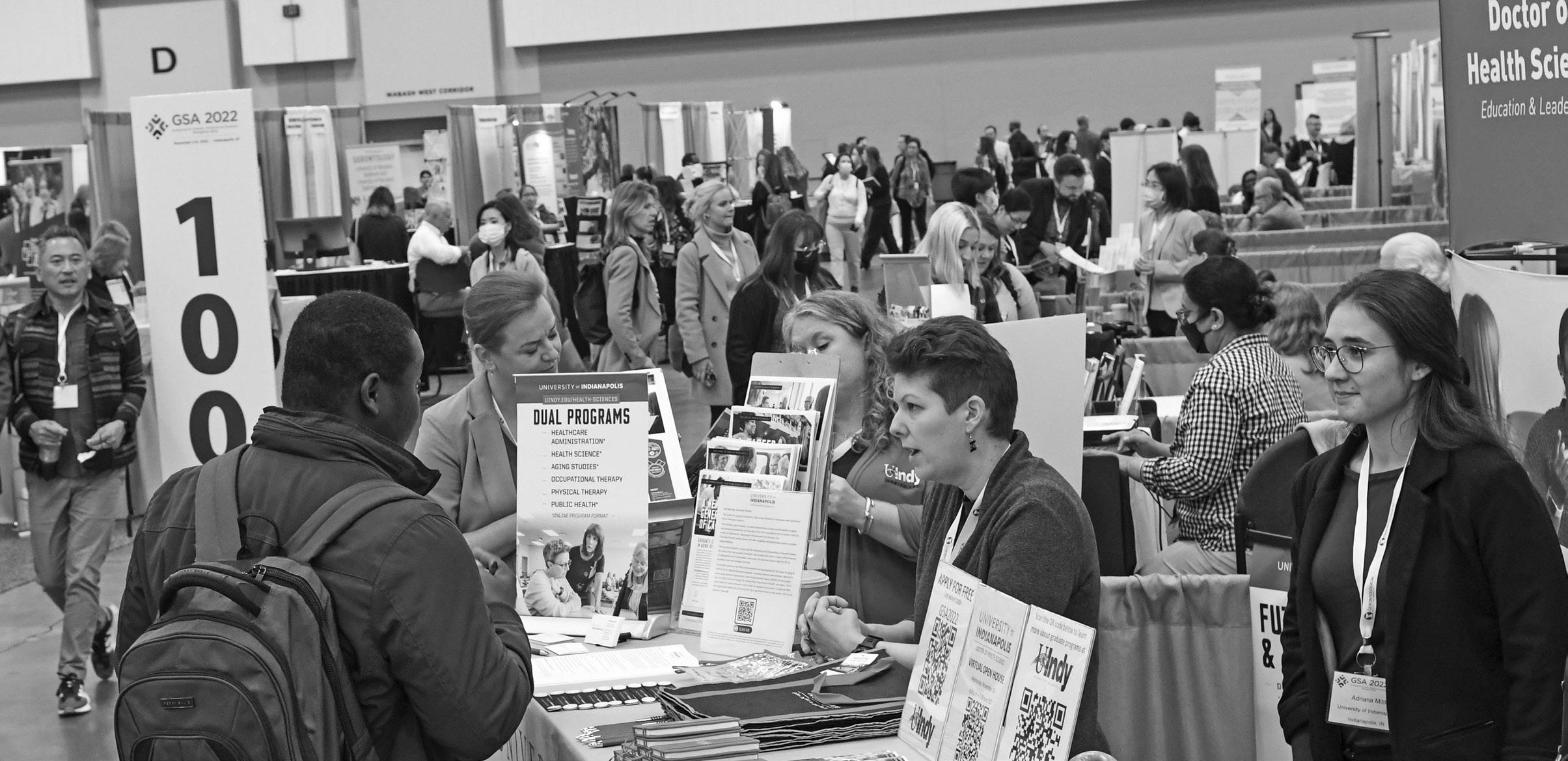
Late Breaking Abstract Submissions are open from July 14 - August 24th. Submit your research as a poster or paper presentation for consideration!
Tampa, FL • November 8-12
GSA2023.org
Building Bridges Catalyzing Research Empowering All Ages

























